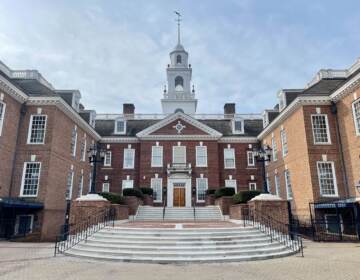Delaware lawmakers approve fiscal year 2025 budget, tee up last week in session
Lawmakers still have dozens of bills left to vote on, with subjects ranging from abolishing the death penalty to the definition of a firearm.

Legislative Hall in Dover, Delaware. (Johnny Perez-Gonzalez/WHYY)
From Philly and the Pa. suburbs to South Jersey and Delaware, what would you like WHYY News to cover? Let us know!
This story was supported by a statehouse coverage grant from the Corporation for Public Broadcasting.
Delaware lawmakers approved the state’s $6.1 billion fiscal year 2025 budget last week, paving the way for a busy final week of session. Lawmakers end their work June 30.
Both chambers passed a plan that gives vital funding for education, health care and social services. It represents an almost 9% increase in spending compared to last year’s budget. Lawmakers also signed off on a $168 million supplemental spending proposal.
Republican Reps. Lyndon Yearick of Camden, Bryan Shupe of Ellendale and Rich Collins of Millsboro voted no, citing concerns over growth in spending.
Budget highlights
The bills make critical investments in education, health care and social services, including funding for teacher salaries, state employee raises and an increase in future retiree health care costs.
“I’m proud of this budget and what it represents to Delawareans — that we value our workers, teachers, seniors, health care workers, parents and children,” said Kim Williams (D., New Castle), co-chair of the Joint Finance Committee.
The budget for fiscal year 2025 directs $50 million to help cover future raises for educators, progressing toward a goal to increase teacher salaries to a base pay of $60,000. It adds $94 million to cover Medicaid costs and services and more than $6 million in state and federal funding to raise Medicaid reimbursement rates for home health workers and people who care for individuals with intellectual and physical disabilities.
It also includes $10 million more in Opportunity Funding, which supports low-income students and multilingual learners; another $10 million for the state’s purchase of care low-income child care program; and $56 million to the Other Post-Employment Benefits fund to cover the cost of future retiree health care needs.
Gov. John Carney typically signs the budget on the last day of the session, along with the capital improvement bill and the Grant-in-Aid bill.
Pending legislation
Lawmakers still have dozens of pieces of legislation they plan to consider or may reconsider.
It’s unclear if Democrats will again try to pass a constitutional amendment that would allow for no-excuse absentee voting. It also included an amendment that would provide for 10 days of early voting. However, the measure failed earlier this month in the House.
“This outcome is deeply disappointing, not just for us, but for the thousands of Delawareans who face significant barriers getting to the polls on Election Day,” said Rep. Sherae’a Moore (D., Middletown) and Sen. Darius Brown, (D., Wilmington), in a joint statement. “For the past several months, we have negotiated in good faith with our colleagues on the other side of the aisle, striving to find common ground and ensure that every eligible Delawarean has the opportunity to vote.”
Republican House Caucus spokesperson Joseph Fulgham blasted the statement, arguing Democrats knew beforehand they didn’t have the votes.
“House and Senate Democrats have only themselves to blame for the failure of the previous laws they enacted on early voting and permanent absentee voting,” Fulgham said in a statement. “They were warned repeatedly that their proposals violated the state constitution but, exhibiting their usual disregard for our state’s foundational document, they passed them anyway.”
The Delaware Supreme Court is expected to issue a ruling soon on an appeal of a Superior Court decision in a 2022 lawsuit striking down a 2019 law allowing early voting and a 2010 law allowing permanent absentee voting. Republicans also have a constitutional amendment allowing early voting, but it has languished in committee.
Senators are likely to try again to pass a bill giving terminally ill patients more end-of-life options. Retiring Democratic Rep. Paul Baumbach (D., Newark) got his bill past the House for the first time in April, but it failed in the Senate earlier this month. The legislation would allow terminally ill people with less than six months to live to request and ingest medication that would end their lives.
The legislation cleared the House in large part because Republican Rep. Kevin Hensley (R., Townsend), whose mother opted for physician-assisted suicide in California last year, voted yes on the measure.
The bill ended up one vote short in the Senate, with four Democrats voting no and one abstaining. Senate sponsor Brian Townsend (D., Newark) switched his vote to no, allowing him to bring it up for another vote again this week.
Two pieces of legislation relating to abortion sponsored by Sen. Kyle Evans Gay (D., North Wilmington) are also likely to move forward this week. One of the bills requires public universities in Delaware to provide access to abortion medication to terminate pregnancy and emergency contraception. Her other abortion-related proposal would require crisis pregnancy centers to display signs that say the center is not licensed by the state and does not employ a licensed medical provider who offers services. Both bills have passed the Senate and are ready for a vote in the House.

Get daily updates from WHYY News!
WHYY is your source for fact-based, in-depth journalism and information. As a nonprofit organization, we rely on financial support from readers like you. Please give today.








